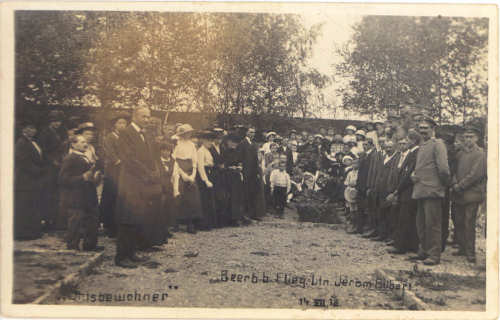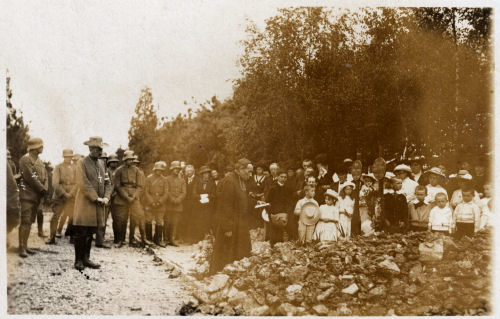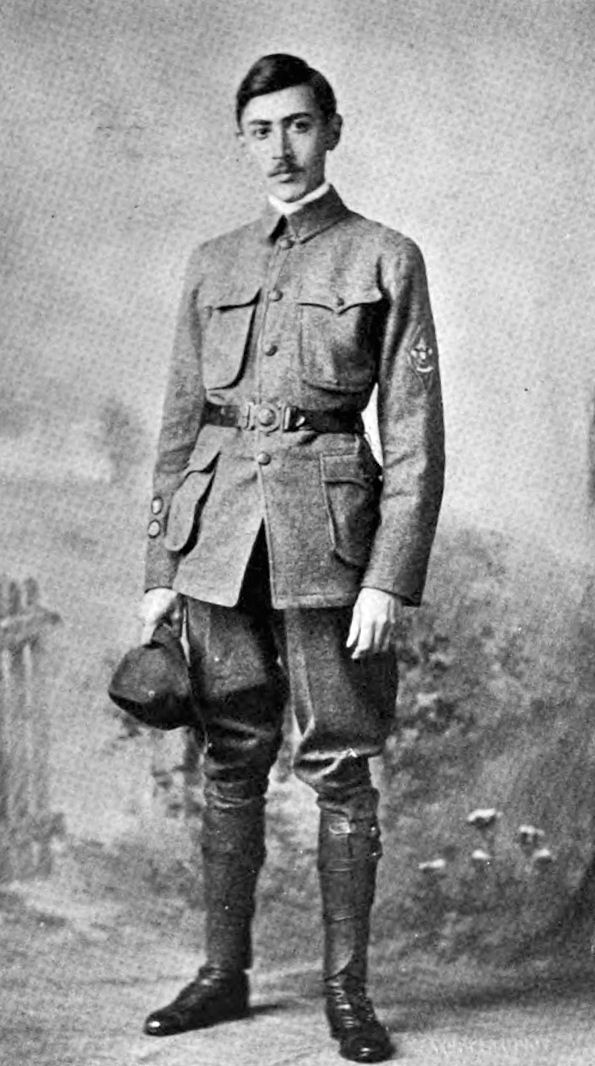|
Nous avons déjà évoqué, dans l'article
Combats aériens - 1914-1918 (Suite),
la mort du jeune
pilote américain Gilbert Nelson Jerome,
abattu près de Verdenal et inhumé à Blâmont, dans le cimetière
militaire allemand.
Dans
« Quatre ans sous le
joug allemand - Journal d'une religieuse de l'hôpital de Blâmont
occupé par l'Allemagne de 1914 à 1918 », soeur Euphémie écrit :
14 juillet 1918
Pour la fête nationale, la population a le devoir bien triste
d'assister au[x] obsèques d'un aviateur américain, dont
l'appareil est tombé en flammes tout près de Blâmont. Voilà la
1ère fois malheureusement que les canons boches atteignent leur
objectif. Les Allemands se surpassent et font au glorieux héros
de grands honneurs : la musique militaire joue, le pa[s]teur
protestant prononce un discours, Mr le curé ajoute quelques
paroles tout-à-fait appropr[iées] et qui font grande impression
sur l'assistance, trois aéroplanes évoluent au-dessus de nous
pendant la cérémonie que notre doyen fait suivre de prières pour
le repos de l'âme de nos ch[ers] Français enterrés ici.

14 juillet 1918 - Enterrement de Gilbert Nelson Jerome

Voici quelques informations biographiques supplémentaires
sur ce pilote :
Obiturary record of graduates of Yale University
1916/17-1918/19.
Sheffield Scientific School
Gilbert Nelson Jerome, Ph.B. 1910
Born November 15, 1889, in New Haven, Conn.
Died July 11, 1918, in Blamont, France
Gilbert Nelson Jerome was born in New Haven, Conn., November 15,
1889. His father, Yan-phou Lee, was born at Fragrant Hills,
Canton, China, the son of a mandarin who held office as literary
sub-chancellor; he was one of the one hundred and twenty youths
sent in 1873 by the Chinese Government to be educated in America;
he graduated from Yale with the degree of B.A. in 1887, and is
at present engaged in business in New York City. His mother,
Elizabeth Maud Jerome, whose name he bore, is the daughter of
Benjamin Nelson and Elizabeth (Gilbert) Jerome. Her father was a
member of the distinguished Jerome family of New London and New
York. Her maternal grandfather, Hezekiah Gilbert, was the son of
Amos Gilbert, one of the original founders of the 2d Company,
Governor's Foot Guard, of Revolutionary fame, and Elizabeth Ann
(Alling) Gilbert, and was sixth in descent from Matthew Gilbert,
who was prominent in the early history of New Haven Colony. Soon
after the Civil War Hezekiah Gilbert gave a piece of land from
the Gilbert estate and founded the Bethany Mission, appointing
to its board of trustees several Yale men. In the past fifty
years many Yale students have been engaged in volunteer
religious work there. Elizabeth Ann Alling Gilbert was a
descendant of Roger Alling, who came from Bradford, England, and
was treasurer of New Haven Colony in 1661, and whose son, John
Alling, was the third treasurer of Yale College.
He received his preparatory training at the New Haven High
School. He took the electrical engineering course in the
Scientific School, and in Junior year was a member of the Cercle
Français.
During the first year after graduation he did volunteer work
with boys at the New Haven Y. M. C. A., and the next year acted
as social and office secretary of the organization. From 1912 to
1914 he attended the Springfield Y. M. C. A. College, graduating
with the degree of Bachelor of Humanics.
He next held a position in the boys' work department of the
International Committee of the Y.M.C.A. in New York City. In the
fall of 1915 he returned to New Haven as executive head of the
New Haven Council of the Boy Scouts of America. He had
contributed several articles on boys' work to American Youth and
had illustrated “Tales Telal” by H. M. Burr. His war poem, “The
Airplane,” took fifth place in the Paris Herald prize contest,
in which there were five hundred contestants.
When the United States entered the war, he volunteered for the
Air Service and was sent to the Massachusetts Institute of
Technology for ground training. He completed his course there in
August, 1917, standing third in his class, and was immediately
sent abroad. He studied at Tours, Issoudun, and Cazaux, and in
February, 1918, was given his commission as First Lieutenant. He
was then sent to Orly, near Paris, to ferry planes around
France, having demonstrated his ability to handle engines. In
June, 1918, he was attached to Spad 90, 8th French Army. Three
weeks later, on July 11, he was sent out, with another member of
his escadrille, to patrol the French lines, and it was at
Blamont, while engaged in this duty, that he lost his life. He
was attacked by four enemy planes which he successfully repulsed.
The action led him over Blamont, and while endeavoring to locate
a nest of anti-aircraft guns, he was struck and instantly killed.
He was buried with full military honors in the German military
cemetery at Blamont, but in the summer of 1919 his body was
moved to the Argonne Cemetery at Romagne-sous-Montfaucon, Meuse.
A memorial window was dedicated to Lieutenant Jerome in Plymouth
Church, New Haven (of which he was a member), on January 4,
1920.
He was unmarried. A sister, Jennie Gilbert Jerome, graduated
from Mount Holyoke College in 1911. She lives with her mother in
New Haven.
New England aviators
1914-1918; their portraits and their records
Ed. 1919
GILBERT NELSON JEROME
First Lieutenant, A.S., U.S.A., Escadrille Spad 90
Eighth French Army
Killed in action, July 11, 1918
Was born Nov. 15, 1889, at
New Haven, Conn. He attended the public schools of New Haven;
graduated from Yale Sheffield Scientific School, in 1910, and
from Springfield Y.M.C.A. College in 1914, winning honors both
in school and college, and the freshman first prize in French at
Yale.
He was deeply interested in the Boy Scout Movement, and was
Scout Executive, for New Haven, from Aug., 1915, to June, 1917,
when he resigned to enter the U.S. Aviation Service. His work
among the boys was remarkably successful, and his name is loved
and honored by them. After his death a "Gilbert N. Jerome
Lecture Course for Scout Leaders" was established in his memory.
He enlisted in June, 1917, and attended the Ground School of the
M.I.T., completing his course with honors. He was sent overseas
in Sept., 1917, and trained at the flying schools near Bourges
and Brest. On Feb. 14, 1918, he was commissioned 1st Lieut., and
assigned the duty of "ferrying" planes from various points
around France.
Early in June, 1918, Lieut. Jerome wrote:
Having finished my training, I am now in the process of being
assimilated with the ten others into French chasse escadrilles,
fighting squadrons. Although none of my special pals came into
this detachment there is a very congenial crowd; Quentin
Roosevelt is one.... We expect soon to be sent to the front, and
will handle the most desirable type of machine. It handles
wonderfully in the air, but the speed is simply terrific, and it
is called a "Spad."
Again he wrote:
I am now at the front going over the lines every day. This
afternoon I went to protect a photographing machine. We met no
hostile planes, but were liberally " strafed " by anti-aircraft.
It is very odd to watch the black balls of smoke suddenly appear
in space out of nothing, and realize that
they are meant for you.
Later in June Lieut. Jerome was assigned, with Lieut. Ross J.
Hoffman, of Philadelphia, to a French escadrille, stationed near
Nancy. Here he met his death from a German anti-aircraft gun, on
July 11, while patrolling the French lines. He fell near
Verdenal, within the enemy lines, and he was buried by the
French people of Blamont, Meuthe-et-Moselle, in a German
military cemetery, with military honors by the enemy.
Lieut. Jerome was among the 16 chosen from 800 contestants for
the 1000-franc prize offered by the "N.Y. Herald" in Paris. His
poem which follows was ranked 7 on the list.
THE AIRPLANE
What strange device is this;
This thing of metal, wood, and cloth,
So cunningly contrived, and gay with colors bright,
Standing alone out on the grassy plain?
Inert and lifeless on its wheels and skid,
Flaunting its glitter to the sun and sky,
It seems some giant's toy rather than
The latest product of the mind of man.
...
And now one comes and grasps the twisted wood,
And with a sudden swing exerts his strength,
His puny human force, there in the face
Of that brute thing, that mass of steel and brass,
When, lo, a miracle is wrought ! Pulsating life
Is born, and from the heart of it
Bursts forth a mighty roar, a storm of sound,
So that the framework shakes and trembles on the ground.
Then, bounding from their hands like some wild thing
Seeking escape from bonds intolerable,
It courses o'er the ground and leaps into the air,
Spurning the lowly earth. Up, up, into the blue
It beats its forward way, until the mighty roar
Fades with the height into a distant drone,
A ceaseless hum, as if some monstrous bee,
Warmed by the summer sun, was flying free.
Thus, godlike, alone, the human being,
Loose from the fetters that for ages long
Have bound his kind to earth, rushes through space
And with a touch controls the soaring planes;
Bends to his will the pent-up power that beats
With frenzied force against the steely walls,
Hurling each piston back until the screw
Cuts the clear air in wisps of vibrant blue.
Such is the miracle of flight; the latest proof
That smouldering deep within the soul of man,
Half-buried ofttimes by the clods which mark
Him still a beast, there lurks the sacred flame,
The will to shape this star dust at his feet
To serve his end, lifting himself thereby until,
Freed from his heritage of passion, fear, and strife,
He mounts to better things, to richer, fuller life.
POEM BY LIEUTENANT JEROME
Written after the death of a comrade
It cannot be, I say it cannot be;
'T is but a moment since he stood
Here in our little group
And smiled and spoke.
A moment's flight, and then
He passes through the gate
That bars our view,
Leaving us desolate.
It cannot be. I say it cannot be,
That he who moved among us,
Winning us all by deeds and words
Of quiet friendliness.
Has lived his few short years
Only to slip away
Into the vanished past,
A sad sweet memory.
It cannot be, I say it cannot be;
Such friends can never die.
He lives beyond the gate;
And when our turn shall come
To step across the threshold
Into a world more fair,
He will be first of those
Who meet and greet us there.
 |













